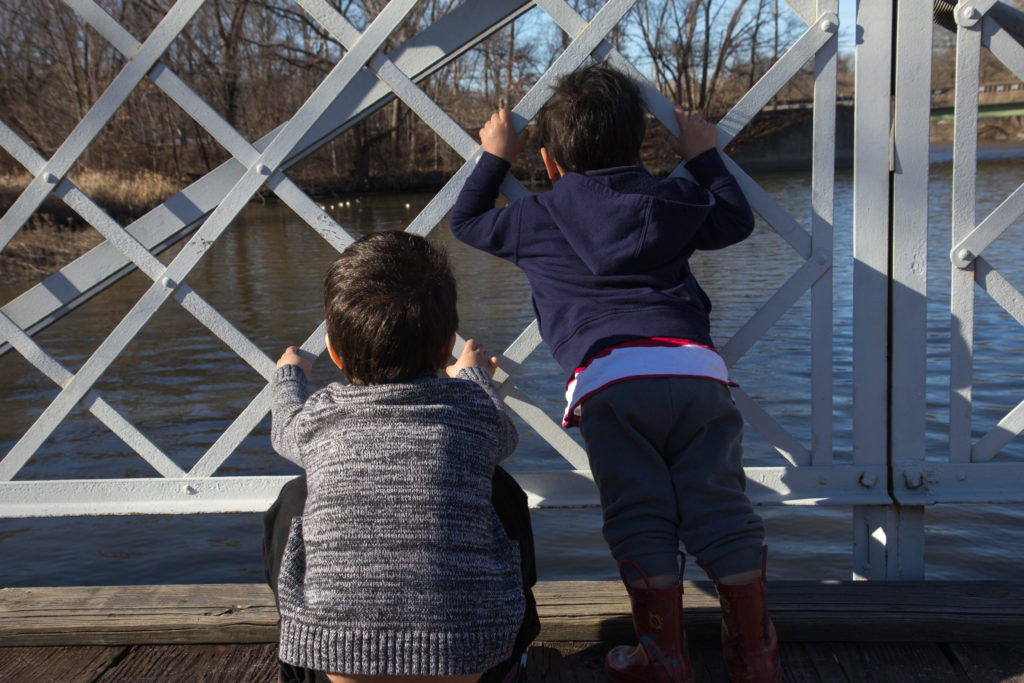On February 25, the family and I attended a local SAVE THE ACA rally at the Bergen County Court House. We didn’t bring a sign but I did wear my collar. K has a nice image of all the signs. Several people in my community rely on the ACA for medical care. 50,000 people in Bergen County will lose their health insurance if the ACA is repealed and not replaced with something that has similar coverage. My faith compels me to desire and do what I can so all have health insurance. I’m in the background of a few of these shots. Next time, I’ll make a sign.
Author: MASadmin
Do Not Be: an Ash Wednesday reflection on Physical Crosses
…we entreat you on behalf of Christ, be reconciled to God. For our sake he made him to be sin who knew no sin, so that in him we might become the righteousness of God.
As we work together with him, we urge you also not to accept the grace of God in vain. For he says, “At an acceptable time I have listened to you, and on a day of salvation I have helped you.” See, now is the acceptable time; see, now is the day of salvation! We are putting no obstacle in anyone’s way, so that no fault may be found with our ministry, but as servants of God we have commended ourselves in every way: through great endurance, in afflictions, hardships, calamities, beatings, imprisonments, riots, labors, sleepless nights, hunger; by purity, knowledge, patience, kindness, holiness of spirit, genuine love, truthful speech, and the power of God; with the weapons of righteousness for the right hand and for the left; in honor and dishonor, in ill repute and good repute. We are treated as impostors, and yet are true; as unknown, and yet are well known; as dying, and see—we are alive; as punished, and yet not killed; as sorrowful, yet always rejoicing; as poor, yet making many rich; as having nothing, and yet possessing everything.
2 Corinthians 5:20-6:10
My sermon from Ash Wednesday (March 1, 2017) on 2 Corinthians 5:20-6:10.
Podcast: Play in new window | Download
A Reflection for Ash Wednesday
As I write this reflection, my two kittens are busy playing on the drying rack for my clothes. They are two little balls of fur; spinning, clawing, and jumping on my drying rack like its their personal jungle gym. My shirts, jeans, and other pieces of clothing are no longer clothes; they are cat toys. Every few minutes, I pick each one off the rack only to watch as they jump back on. This cycle is part of the game and it’s a game my kittens will do nothing to break.
The ashes we’re using tonight are not brand new. They are part of their own cycle. Last March, on Palm Sunday, we marked the beginning of Holy Week by celebrating Jesus’ final journey into Jerusalem. We welcome him into the city by waving palm branches in the sky. After the service, we saved the palms, tied them in a bundle, and hid them in a storage room. For the last year, they’ve sat undisturbed, slowly drying out. Yesterday, I took the bundle to our outdoor barbecue. I shared a prayer and burned those palms to ash.
The ashes used tonight show us how our worship is connected to a wider story. When we gather together to share Jesus’ story and live in God’s promises, we are participating in something that is more than one time event. We are connected to God’s story. And God’s story covers the past and the future. By being part of God’s creation, we are included in God’s story cycle. Tonight, when the ashes are placed on our forehead, we will hear words reminding us of that story. We’ll hear words of promise, connecting God’s spirit of creation to the reality of our mortality. And we’ll remember that, through Jesus, we’re always with God, no matter where our life cycle takes us.
Each week, I write a reflection on one of our scripture readings for the week. This is from Christ Lutheran Church’s Worship Bulletin for Ash Wednesday, 3/1/2017.
Six Days Later: What Was Moses Doing?
Our First Reading was Exodus 24:12-18.
What did Moses do during his first six days on the mountain? Before my bible study this week with other local Lutheran pastors, I never noticed this detail before. In our text from Exodus today, the Israelites are camped at the foot of Mt. Sinai. After escaping slavery in Egypt, they are learning how to live together. God is in the center of the community, covering Mt. Sinai in a cloud. God summoned Moses so Moses heads up the mountain. For six days, Moses is up there before God calls for him. So what does a person do when they’re waiting for God?
This text is full of allusions to other stories from scripture. In the story of Genesis, God worked for six days before resting on the seventh. During Noah’s great flood, the ark finally lands on a mountaintop as the water recedes from a rainstorm that lasted 40 days and 40 nights. People of the faith like Abraham, Sarah, and Jacob met God on various mountaintops and usually built on the spot where they saw God. And in earlier parts of the Exodus story, God is a cloud providing shade from the sun during the day and God is a cloud of fire providing light at night. In one short text, we see God as a creator, protector, savior, judge, and all-powerful presence. But we also meet a God who sometimes makes us wait.
The text doesn’t tell us what Moses was doing while he was waiting for God. He knew he was in God’s presence. The cloud gave that away. Yet, even Moses had to deal with God being silent. I imagine Moses took care of himself during those six days. He cooked his meals, slept outdoors, and kept himself busy. Moses kept living his life while waiting for God to finally speak. And I imagine we know what Moses waiting game feels like. We will hear in church today words of hope, promise, and hear how Jesus is here, right now, for us to eat and drink. Yet we might wonder why we can’t hear God speaking. I wish I had an answer for your why. But I don’t. Instead, we all have a story where even Moses had to wait. He had to keep living while he waiting for God to speak. But God’s silence does not mean God isn’t present. When we can’t hear God, God is still there. And God’s presence means God will speak and that, someday, we will finally hear.
Each week, I write a reflection on one of our scripture readings for the week. This is from Christ Lutheran Church’s Worship Bulletin for 2/26/2017.
Lord Goes Boom: Chasing Mountaintop
Six days later, Jesus took with him Peter and James and his brother John and led them up a high mountain, by themselves. And he was transfigured before them, and his face shone like the sun, and his clothes became dazzling white. Suddenly there appeared to them Moses and Elijah, talking with him. Then Peter said to Jesus, “Lord, it is good for us to be here; if you wish, I will make three dwellings here, one for you, one for Moses, and one for Elijah.” While he was still speaking, suddenly a bright cloud overshadowed them, and from the cloud a voice said, “This is my Son, the Beloved; with him I am well pleased; listen to him!” When the disciples heard this, they fell to the ground and were overcome by fear. But Jesus came and touched them, saying, “Get up and do not be afraid.” And when they looked up, they saw no one except Jesus himself alone. As they were coming down the mountain, Jesus ordered them, “Tell no one about the vision until after the Son of Man has been raised from the dead.”
Matthew 17:1-9
My sermon from Transfiguration (February 26, 2017) on Matthew 17:1-9.
Podcast: Play in new window | Download
The Life-Changing Magic of Lent. From Pastor Marc – My Message for the Messenger, March 2017 Edition
I typically need to remind myself that there is a blessing in having stuff. When I step on a Lego with my barefoot, trip over the corner of a misplaced ottoman or bang my head on a ceiling lamp that is too low, I want to throw everything away. But having stuff is a problem I’m blessed to have. Too many people in our world and in our neighborhood do not have the stuff I have. Many spend their months trying to decide which bill to pay, which meal to skip or how they can make their old car last longer. Having stuff means I have resources at my disposal that others do not have. But it also means I run the risk in having stuff overwhelm, distort, and disrupt my life, relationships and spirituality.
As I prepare to lead a mid-week Lenten series on the Small Catechism, I have been reading books on decluttering. Marie Kondo’s The Life-Changing Magic of Tidying Up, Ruth Soukup’s Unstuffed, Stuffocation, Spark-Joy, A Decluttering Handbook for Creative folks, and The Joy of Leaving Your Stuff All Over the Place, are on my nightstand. Each book promises that we have the power to gain order and control over our lives. We can, through certain acts and habits, clear the clutter from our homes, relationships and soul. By looking at what we have, we can see ourselves more clearly.
When Luther put together The Small Catechism, he was offering parents and heads of households an opportunity to look at what they have. They, and we, have Jesus. Through the Ten Commandments, Apostles’ Creed, the sacraments and prayers, entire families could discover Jesus’ love for them and how Jesus’ love changes everything. This Lent we’re going to see how the The Small Catechism is more than just a book we teach to teenagers. It’s a way to discover Jesus and live out our faith in a very real way.
See you in church!
Pastor Marc
Watching Geese
Taken while celebrating George Washington’s Birthday At Historic New Bridge Landing 
Do You Not Know: Following and Telling Stories
According to the grace of God given to me, like a skilled master builder I laid a foundation, and someone else is building on it. Each builder must choose with care how to build on it.
For no one can lay any foundation other than the one that has been laid; that foundation is Jesus Christ.
Do you not know that you are God’s temple and that God’s Spirit dwells in you? If anyone destroys God’s temple, God will destroy that person. For God’s temple is holy, and you are that temple.
Do not deceive yourselves. If you think that you are wise in this age, you should become fools so that you may become wise. For the wisdom of this world is foolishness with God. For it is written, “He catches the wise in their craftiness,” and again, “The Lord knows the thoughts of the wise, that they are futile.”
So let no one boast about human leaders. For all things are yours, whether Paul or Apollos or Cephas or the world or life or death or the present or the future—all belong to you, and you belong to Christ, and Christ belongs to God.
1 Corinthians 3:10-11,16-23
My sermon from 7th Sunday after Epiphany (February 19, 2017) on 1 Corinthians 3:10-11,16-23.
Podcast: Play in new window | Download
Be Perfect: Wait. What?
The Gospel Reading is Matthew 5:21-37.
In our gospel reading today, we’re still in Jesus’ Sermon on the Mount. Last week, we heard the first twelve verses from that sermon. Today, we’re hearing the next 8. For Matthew, being a follower of Jesus Christ means we are students. Being with God involves regular learning, study, and education. Jesus, as he begins this sermon, is with his disciples. They are gathered around him and Jesus begins to teach. Jesus should teach because he is a rabbi and that’s what teachers do. The disciples, as followers, are called to learn and grow from what their teacher tells them. Being a disciple is more than just doing what we’re told. As a student, the more we learn, the more we are changed. As we study with God through scripture, worship, and prayer, we are transformed. Jesus isn’t just giving his disciples knowledge. Through their learning and education, the disciples are being changed into who God wants them to be.
But, according to Matthew, learning about God is not enough. In verse 20, we hear that our “righteousness” needs to exceed the righteousness of “the scribes and the Pharisees.” As Christians, we’re used to belittling the scribes and Pharisees. We paint these two groups as people who just don’t “get it.” We claim that their religious devotion and education blinded them to what God was doing in Jesus. If they stopped trying to learn about God and just see God, they would have recognized Jesus.
But these arguments are not Matthew’s arguments. Matthew isn’t against learning because that’s one of the ways we live as followers of Jesus. In Jesus’ day, education was something very few had access too. The scribes and Pharisees were as educated as someone could get. They could read, write, and study God’s word fro themselves. Their communities took care of them while they studied and learned. If anyone in Jesus’ world had the time, energy, and resources to learn about God, it was the scribes and Pharisees. Jesus’ demand to his followers in verse 20 is a heavy one. They are to know God more than anyone. How can they? Because, as disciples, God changes who they are. They are not only disciples. They are salt and light. They are more than who they were before and they called to live that identity out in all that they say and do.
Each week, I write a reflection on one of our scripture readings for the week. This is from Christ Lutheran Church’s Worship Bulletin for 2/19/2017.


